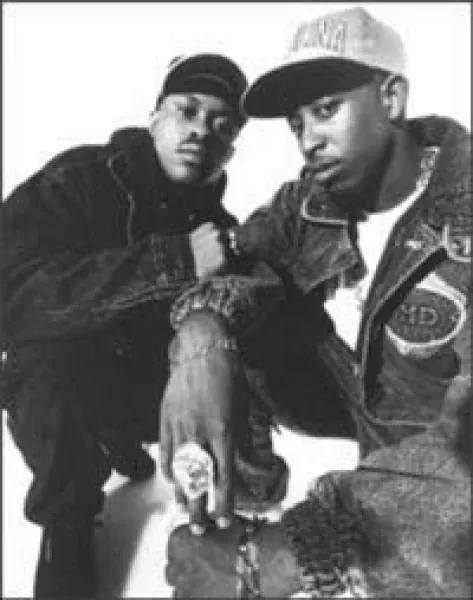
Gang Starr
Top Gang Starr albums
Top Gang Starr lyrics
Gang Starr biography
Never overly prolific nor overly popular, Gang Starr nonetheless became and remain one of hip-hop's most admired acts ever, the duo's legacy nothing short of legendary in terms of influence. DJ Premier and Guru, the duo's respective producer/DJ and lyricist/MC, set standards for early-'90s hip-hop with their two touchstone releases: Step in the Arena (1991) and Daily Operation (1992). Beginning with these releases, both listeners and critics heaped mounds of praise upon Premier and Guru -- the former because of his DJ-style beatmaking and jazzy sound, the latter because of his socially conscious lyrics and no-nonsense stance. Following these two undisputed cla**ics, Premier became one of New York's most demanded producers and crafted hits for the city's finest MCs: the Notorious B.I.G., Nas, Jay-Z, KRS-One, and more. Guru likewise collaborated with plenty of famous artists -- Roy Ayers, Donald Byrd, N'Dea Davenport, and more -- on his solo debut, Jazzmatazz, Vol. 1. After this point, however, Gang Starr became somewhat of a side project for Premier and Guru, who both forged on with their respective solo careers. More albums came -- each impressive, beginning with the tough Hard to Earn album in 1994 -- yet Gang Starr had already attained their summit of popularity and acclaim in the early '90s and, as a result, continually battled their own growing legacy, as fans billed every successive album as a comeback.br /br /Premier and Guru began humbly enough, releasing No More Mr. Nice Guy (1989), an ambitious debut album seeking to heavily incorporate a jazz aesthetic into hip-hop. Ambitious or not, the formative album didn't impress too many (though there were promising moments like "Manifest" and "DJ Premier in Deep Concentration"), and Gang Starr took two years to reconsider their approach. The duo then returned with a new record label and a fresh approach. It worked marvelously as Step in the Arena (1991) set new standards with not only its beats but also its lyrics. Premier had blossomed into one of New York's most savvy producer/DJs, capable of using samples in ways never before imagined and garnered much acclaim for his subtle use of jazz. Similarly, Guru's literate, thoughtful, and, most of all, earnest lyrics stood out among the brash materialism increasingly plaguing the genre, and his trademark monotone delivery didn't hurt either. A year later came Daily Operation (1992). If Step in the Arena had been and remains a masterpiece, this album is nothing short of that mark; in fact, it's generally viewed as Gang Starr's crowning achievement. br /br /While both Step in the Arena and Daily Operation astounded critics and street-level listeners, the albums never inspired any big breakthrough hits, and Gang Starr remained somewhat of a cult favorite. Songs like "Just to Get a Rep," "Step in the Arena," "Take It Personal," and "Soliloquy of Chaos" became underground cla**ics but never crossed over to the mainstream. Despite Premier's reputation as a hitmaker, Gang Starr openly spurned "ma** appeal" and refused to adjust their style to any sort of trend. Hard to Earn (1994) strongly confirmed this anti-commercial stance, especially the "Ma** Appeal" single, and the duo didn't return until four years later with Moment of Truth (1998) and Full Clip (1999) shortly after. The former album and its big single, "You Know My Steez," proved that, despite Gang Starr's long absence, Premier and Guru could still make excellent hip-hop -- an entire album of it, in fact. The latter album, a double-disc retrospective commemorating Gang Starr's ten-year anniversary, showcased some of the duo's best moments and added some bonuses for long-time fans.br /br /Following the best-of collection, Premier and Guru quietly rested the Gang Starr moniker. Even so, they remained active over the years: Guru continued releasing star-studded solo albums, and Premier continued producing countless tracks for New York's finest. While it's somewhat ironic that Premier produced so many across-the-board hits for others but not himself, Gang Starr never attained Nas- or Jay-Z-level stardom Ibecause/I of their uncompromising, somewhat highbrow style, something which the two refused to dilute with ma** appeal, precisely the reason why their influence has proven so timeless. ~ Jason Birchmeier, All Music Guide
